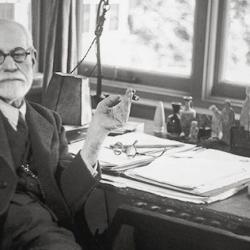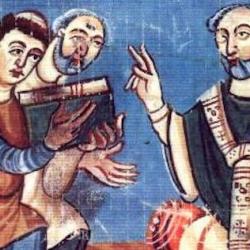Joan Copjec’s 1994 Read My Desire (recently reprinted by Verso) sets Lacan against the historicists, specifically against Foucault. But also, along the way, Lacan against the structuralists. It’s dense going, as one might expect.
Early on, Copjec isolates the trouble with Foucault. He “realizes the necessity of conceiving the mode of a regime of power’s institution,” carrying out his genealogical program,” but “he cannot avail himself of the means of doing so and thus, by default, ends up limiting that regime to the relations that obtain within it.” He ends up, she says, “a bit of a historicist” and “a bit of a nominalist,” and one might add “a bit of a structuralist” (7).
Why does Foucault fail? Copjec says it arises from “his diallowance of any reference to a principle or a subject that ‘transcends’ the regime of power he analyzes.” He firming rejects any notion of a metaprinciple, a “principle of construction or staging” that occupies “a different, a superior, position to the regime it stages.” He cannot assume, in Derrida’s terms, a transcendent signified, an extra-structural something that eludes structuration. In the end he “abandons, without actually acknowledging that he is doing so, his attempt to define the very principle he supposedly seeks” (7).
One cannot simply do away with transcendence in this way: “some notion of transcendence is plainly needed if one is to avoid the reduction of social space to the relations that fill it.” Foucault rejects a language-based analysis (structuralism) because he thinks it leads to idealism; instead, he offers a battle-based model. Copjec thinks this is a fatal decision: Only a linguistic model is able to escape idealism. She observes that in a materialistic science “no object can be legitimately posited unless one can also specify the technical means of locating,” and similarly “the existence of a thing materially depends on its being articulated in language, for only in this case can it be said to have an objective – that is to say, a verifiable – existence, one that can be debated by others” (8). The linguistic model doesn’t imply a metalanguage, but to deny the existence of a metalanguage is to affirm that “society never stops realizing itself, that it continues to be formed over time” (9).
It is along these sorts of lines that Lacan stands against historicism and structuralism, without reverting to theology. Copjec’s explanations of Lacan are difficult, but the point is well made by a couple of illustrations she offers from Freud. In Totem and Taboo, Freud traces the relations among brothers/sons to the origin, to “the existence of some preposterous being, a primal father who once possessed all the power the brothers now equally share and whose murder is supposed to have issued in the present regime.” The theory is dismissed as typical Freudian crackpottery, but Copjec slyly notes that this is more or less Freud’s point: the father “is unbelievable within the regime in which his existence must be unthinkable if relations of equality are to take hold” (12). The preposterousness of the theory is evidence of its truth. And Freud is showing that “the real structure, of a society of equals . . . is irreducible to the labile relations of equality.” Rather “the petty jealousies and feelings of powerlessness that threaten these relations, that block their permanent realization, betray their guilty origins, the cause that they must efface” (12).
Copjec finds similar dynamics in Beyond the Pleasure Principle, where Freud acknowledges the centrality of the pleasure principle in psychic life but “he then seeks, by means of the death drive, to account for this centrality, to state the principle by which the principle of pleasure is installed” (13). The death drive is not a second principle, but plays the role of the father in the primal horde. It is necessary to explain the reign of the pleasure principle.
In each of these texts, Freud explains that “the transcendental principle, or the principle of the principle of rule, is in conflict with the principle of rule itself.” Neither of these principles can win, “since the very existence of the empirical field always presupposes the existence of its cause, and since the cause can never exist abstractly, in the absence of that which it effects” (13).
This is the way of transcendence: No metaprinciple, and yet the whole internal structure depends on some “transcendent” episode that must be suppressed. The society of equals exists only because of the now occluded origin; yet the society of equals can never be realized because of the guilt from those same occluded origins. Thus far Freud the tragedian of social order.
This is the way of transcendence, if one insists on rejecting theology.















